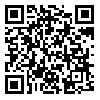BibTeX | RIS | EndNote | Medlars | ProCite | Reference Manager | RefWorks
Send citation to:
URL: http://jrh.gmu.ac.ir/article-1-592-en.html
2- Department of Educational Sciences, Faculty of Human Science, University of Urmia, Urmia,
Models and various studies have attempted to by examine the relationship personality and cognitive variables, explains symptoms of depression and anxiety. Thus, this study aimed to determine the role of worry and rumination in relationship neuroticism with syndromes of depression and anxiety in students. The sample included 210 students (164 female and 46 male) who were randomly selected from among Payam Nour University of Talesh. Pennsylvania State Worry Scale, Zung depression test, rumination scale of Nolen- Hoeksema and Maror, Speilberger trait anxiety subscale and Neuroticism subscales of the NEO Personality Inventory were completed by students. Data were analyzed by using structural modeling method (Lisrell). The results showed that neuroticism and rumination had the greatest impact on depression. Based on the analysis, the indirect effect of worry on depression was also a significant coefficience. The relationship between anxiety with worry, rumination and Neuroticism variables were insignificant in structural modeling method that was eliminated. Also, there was significance relationship between worry and Neuroticism with rumination. The variables of neuroticism, rumination and worry are able to predict depression in non-clinical populations.
Received: 2013/12/25 | Accepted: 2014/09/24 | Published: 2016/02/27
| Rights and permissions | |
 |
This work is licensed under a Creative Commons Attribution-NonCommercial 4.0 International License. |






